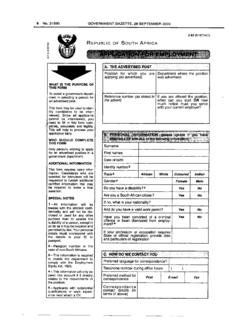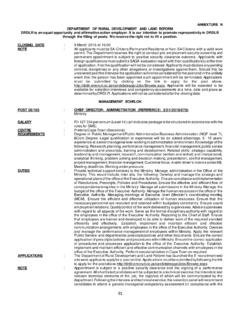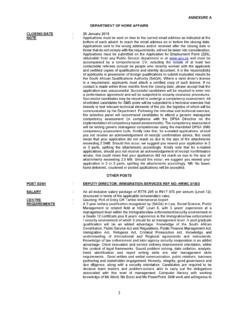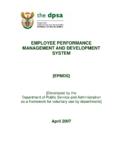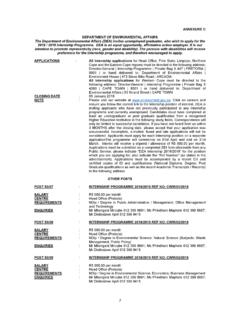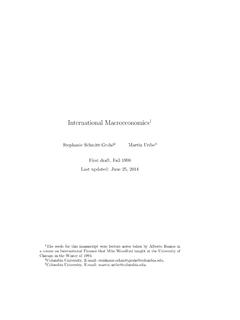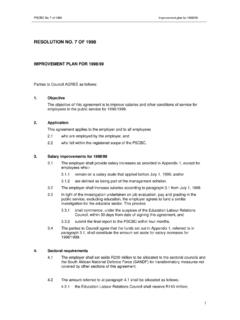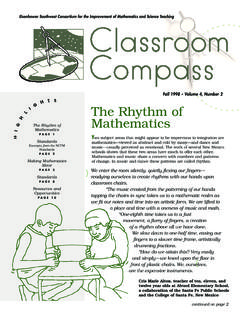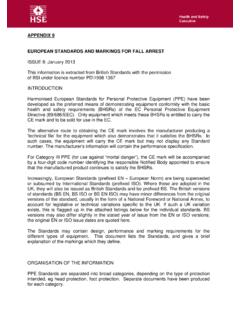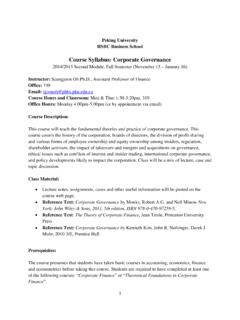Transcription of PSCBC Resolution 8 of 1998 - the dpsa
1 PSCBC Resolution No. 8 of 1998 Trade Union Negotiators and Officials 1 Resolution NO. 8 OF 1998 . COLLECTIVE AGREEMENT: TRADE UNION NEGOTIATORS AND TRADE UNION OFFICIALS FOR THE PUBLIC SERVICE CO-ORDINATING BARGAINING COUNCIL Agreement regulating the rights and obligations of negotiators and officials in the council 1) This agreement regulates the rights and obligations of the employer and trade unions on negotiators and officials in the council. 2) This agreement applies to the employer and trade unions regarding the utilisation of their members who are: a) employed by the State; and b) who fall within the registered scope of the council.
2 Objectives of this agreement 3) The objects of this agreement are to regulate the: a) mechanisms whereby special secondment is granted by the employer to negotiators or officials; b) granting of time off for negotiators or officials to participate in activities related to labour relations; c) method of payment of negotiators or officials; and d) protection of the position and career path of negotiators or officials. Obligations of the employer 4) Upon request from a trade union the employer shall: a) provide special secondment to negotiators or officials for labour relations activities, including: i) negotiations in the council; or ii) the settlement of individual or collective disputes in the council.
3 B) continue to pay the negotiator or the officials remuneration for the period during which the negotiator or officials is on special secondment; c) ensure that the position of the negotiator or official is protected for the period during which the negotiator or official is on special secondment. In this regard, the relevant employer1 shall conclude an agreement with the negotiator or official regulating: i) the grade that the negotiator or official is employed on at the time of commencing the period of special secondment; ii) the grade and location that the negotiator or official will return to at the end of the period of special secondment; 1 The statutory authority of the employer is vested in the executing authority- see section 1 (Interpretation) of the Public Service Act, Proclamation no 103 of 1994 PSCBC Resolution No.
4 8 of 1998 Trade Union Negotiators and Officials 2 iii) the form of performance assessment, if any, that will apply to the negotiator or official during the period of special secondment; iv) any promotion that the negotiator or official, if any, is entitled to during the period of special secondment; v) the duties of the negotiator or official, which may include any trade union activities defined by the trade union; and vi) the non accumulation of leave during the period of special secondment. 5) During the period of serving as a negotiator or official the negotiator or official will not be subject to the discipline of the employer for activities related to the duties of a negotiator or official.
5 6) The employer will not interfere with, restrain, coerce or discriminate against the negotiator or official, unless otherwise allowed by law. Obligations of the Trade Union 7) The trade union shall: a) minimise, as far as possible, the amount of special secondment requested for negotiators or officials; b) ensure that the negotiator or official only takes special secondment for labour relations activities; and c) reimburse the employer for the cost of the negotiator s or official s remuneration for the period that the negotiator or official is on special secondment. This sub clause will be re-evaluated within six months of the conclusion of this agreement.
6 Number of Negotiators or Officials 8) The employer shall provide special secondment to a number of negotiators or officials equal to three times the number of trade union representatives in the council. Period of Notice 9) The trade union will notify the employer at all levels, in writing, of a special secondment 30 days prior to the special secondment commencing, unless otherwise agreed. Monitoring of this agreement 10) The council will monitor the implementation of this agreement. PSCBC Resolution No. 8 of 1998 Trade Union Negotiators and Officials 3 Disputes 11) If there is a dispute about the interpretation or application of this agreement any party may refer the matter to the council for Resolution in terms of the dispute Resolution procedure of the council.
7 Definitions 1) Any expression used in this agreement which is defined in the Labour Relations Act, 1995 (Act no. 66 of 1995) will have the same meaning as in that act except that: a) Council means the Public Service Co-ordinating Bargaining Council; b) Employee means an employee: i) employed by the State; and ii) who falls within the registered scope of the council c) Employer means the State as employer; d) Negotiator means an employee appointed by a trade union to represent the trade union in negotiations with the employer in the council. e) Official means a person appointed or elected by the trade union to hold office in the trade union in terms of the constitution of the trade union; f) Remuneration means salary, medical aid contributions, pension contributions, car allowance, home owner allowance, overtime where commuted into a monthly allowance and service bonus but excludes the foreign service dispensation.
8 G) Special secondment means unpaid leave granted to a negotiator or official of a trade union by the employer. Secondment does not carry the meaning set out in section 15 of the Public Service Act, Proclamation no 103 of 1994. h) Trade union means a trade union, or two or more trade unions acting together, who are parties to the Council.

